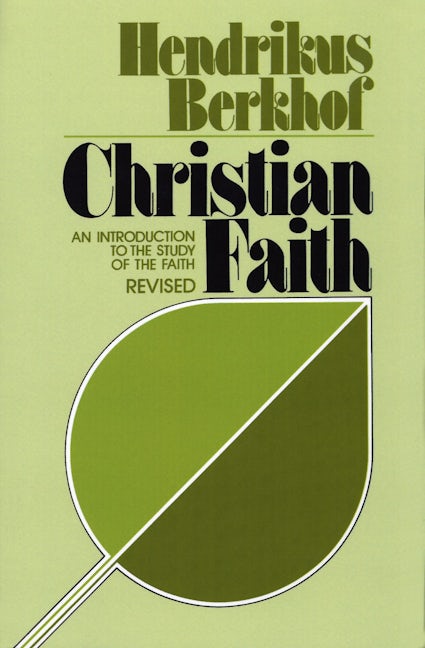1
/
of
1
Hendrikus Berkhof
Christian Faith
Christian Faith
Regular price
$53.99 USD
Regular price
Sale price
$53.99 USD
Unit price
/
per
Shipping calculated at checkout.
Couldn't load pickup availability
This is a print on demand book and is therefore non- returnable.
In today's secular world, the Christian faith is viewed as only one aspect of what could be called "religious life." Acknowledging this, Hendrikus Berkhof begins this thought-provoking study with a sketch of religion and faith in general before narrowing it down to a discussion of the specific place of Christian faith. Beginning with the whole of reality makes it possible to use "religion" as the basis from which to acquire an understanding of the relevance of the Christian faith for that total reality. Thus, a study of Christian faith can answer questions that deal with the place of humanity in the cosmos, the meaning of life and existence, the meaning of freedom and of death.
Berkhof defines "religion" as the relation to the absolute. "Faith" is one step beyond religion, as it is the establishment of God's relationship to his people. Christian faith builds on Old Testament faith because the promises of the Old Testament are accepted as being fulfilled in the ministry, suffering, death, and resurrection of Jesus Christ.
For Berkhof the study of Christian faith is a systematic examination of the content of the relationship which God in Christ has entered into with us. Because the study of the faith is systematic, there must be an order to it. This order varies from theologian to theologian; for Berkhof the starting point is revelation — the sources and norms for our knowledge of God. This leads to a discussion of God, creation (of the world and of human beings), Israel, the person and work of Christ, the church, and finally, the renewal of the world and of humanity. Throughout the book Berkhof comments on (and often takes issue with) systematic theologians of the past.
Written for both the layperson and the scholar, the text is interspersed with excurses (set off in smaller type than the main text) that cover specific subjects more thoroughly, citing sources, controversies, and the like, which will be of particular interest to theologians and students. This newly revised edition, a translation of the Dutch fifth edition, takes into account developments in dogmatics in the thirteen years since Berkhof prepared the first edition of Christian Faith.
Berkhof's aim throughout is to present his understanding of the truth of God; but, as he writes in his preface, "the study of the faith is not something to learn so much as something to do and practice. A book can do no more than help us to get started and stimulate us to try to do it on our own." This book, like the earlier edition, admirably succeeds in meeting that goal.
In today's secular world, the Christian faith is viewed as only one aspect of what could be called "religious life." Acknowledging this, Hendrikus Berkhof begins this thought-provoking study with a sketch of religion and faith in general before narrowing it down to a discussion of the specific place of Christian faith. Beginning with the whole of reality makes it possible to use "religion" as the basis from which to acquire an understanding of the relevance of the Christian faith for that total reality. Thus, a study of Christian faith can answer questions that deal with the place of humanity in the cosmos, the meaning of life and existence, the meaning of freedom and of death.
Berkhof defines "religion" as the relation to the absolute. "Faith" is one step beyond religion, as it is the establishment of God's relationship to his people. Christian faith builds on Old Testament faith because the promises of the Old Testament are accepted as being fulfilled in the ministry, suffering, death, and resurrection of Jesus Christ.
For Berkhof the study of Christian faith is a systematic examination of the content of the relationship which God in Christ has entered into with us. Because the study of the faith is systematic, there must be an order to it. This order varies from theologian to theologian; for Berkhof the starting point is revelation — the sources and norms for our knowledge of God. This leads to a discussion of God, creation (of the world and of human beings), Israel, the person and work of Christ, the church, and finally, the renewal of the world and of humanity. Throughout the book Berkhof comments on (and often takes issue with) systematic theologians of the past.
Written for both the layperson and the scholar, the text is interspersed with excurses (set off in smaller type than the main text) that cover specific subjects more thoroughly, citing sources, controversies, and the like, which will be of particular interest to theologians and students. This newly revised edition, a translation of the Dutch fifth edition, takes into account developments in dogmatics in the thirteen years since Berkhof prepared the first edition of Christian Faith.
Berkhof's aim throughout is to present his understanding of the truth of God; but, as he writes in his preface, "the study of the faith is not something to learn so much as something to do and practice. A book can do no more than help us to get started and stimulate us to try to do it on our own." This book, like the earlier edition, admirably succeeds in meeting that goal.
Share


